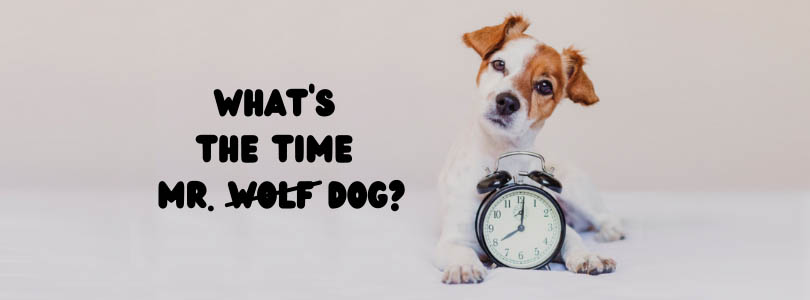Does daylight savings affect our dogs?

Many of us use the start of British Summer Time (or Daylight Saving Time) as a sign that winter is officially over! Happening this year on Sunday 27th March, it means longer, lighter days, brighter starts, and hopefully some warmer, drier weather.
For those with children, it can mean a bit more of a battle at bedtime as little ones question why the sun is still out. For those with dogs… well what does it mean? Do the clock changes have any impact on our dogs? Let’s take a look and find out.
The science-y bit
Time – as in days, weeks, months, hours, minutes, seconds - is a concept created by humans. Animals don’t look at a calendar or clock to understand where they are in ‘time’. They rely on their internal circadian rhythm – or their ‘biological clock’. This determines what they should be doing and when, and is controlled by sunlight.
Changes in light availability (i.e., the amount of daylight or sunlight we experience), leads to changes in the hypothalamus. The hypothalamus is a small area of the brain responsible for releasing hormones and maintaining daily physiological cycles such as sleep, brain activity and body temperature. This all has a huge impact on animal behaviour (humans included).
Did you know? When the hypothalamus is exposed to light, it suppresses the production of melatonin – the hormone that is responsible for supporting sleep in the sleep-wake cycle.
This means that when the clocks change (another concept created by humans!), we establish a different routine of light allowance, which changes our sleep/wake cycles (and therefore other daily activities).
Habits & routines
Dogs are renowned for being animals that rely on routine. Most dogs have very precise daily routines and thrive when they eat, poop, exercise and sleep around the same times each day. When this is disrupted – for example when travelling or experiencing time changes – it can cause anxiety and stress in some dogs. If your dog is particular sensitive to changes in their routine, try and spread the change over a week to make the change in mealtimes or sleep times more gradual. You can even keep their mealtimes the same regardless of whether the clocks go forwards or backwards.
Fresh, fresh air!
Logically, the longer, lighter days and kinder weather means many dogs get to spend more time outside during daylight saving time. This can be hugely beneficial to their mental health and stimulation levels, but be sure to keep an eye out for hidden dangers such as toxic plants, adders and traffic.
Did you know? Dogs tend to have a species-typical surge in energy mid-morning and early-evening.
Dog walks in the early evening (which are much lighter during British Summer Time), are ideal to spend some energy.
Home alone
Summertime is also when humans become much more sociable, enjoying the sunshine with friends and family. This may mean you are away from home more often, and for longer periods of time, so remember to bear this in mind if your dog’s behaviour starts to change. They may be experiencing separation anxiety. Consider asking a friend or neighbour to pop in and let your dog out if you’re planning on being away for an extended period of time, or book a dog walker to come and take them out for a good walk.
Although many dogs won’t batter an eyelid (sleepy or not) to the clock changes, some dogs are more sensitive to others, and being aware and sensitive to this is important. If you experience any extreme changes in behaviour or mood, it might be worth chatting to your vet to rule out any other potential causes.




